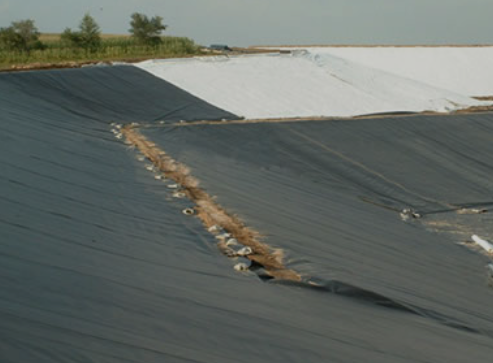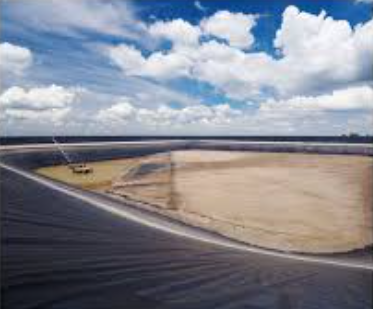- Understanding the Role of Geomembrane Liners in Waste Management
- Innovations in Geomembrane Liners for Water Management
- Geomembrane Liners: A Comprehensive Guide
- The Future of Geomembrane Liners in Civil Engineering
- Geomembrane Liners: Enhancing Landfill Stability
Manager:Alvin Wang
WhatsApp:+62 8983806051
Tel:+86 10-5797-1075
Email:steelwang@okorder.com
Address:3rd Floor, No.2 Building, No.1 Sanlihe Road
What is the life of HDPE geomembrane?
High-Density Polyethylene (HDPE) geomembrane is a widely-used artificial lining used in civil engineering and environmental protection applications because of its strength, flexibility, and waterproofness. hdpe Geomembranes are often used by engineers and project owners to hold waste at landfills, ponds, reservoirs, or wastewater treatment plants for many years. This article explores factors influencing the life span of HDPE geosynthetic materials such as material properties, installation methods, environmental conditions, and maintenance practices.

Understanding HDPE Geomembrane
HDPE geomembranes are made from thermoplastic materials called high-density polyethylene resins that have good resistance to puncture and tear in addition to ultraviolet degradation and chemical attack. It can adapt itself even on rough surfaces due to its flexibility. Therefore, they are the best containment solutions for long-term performance and reliability.
Material Properties
The product’s lifespan relies mainly on the material properties such as density; molecular weight as well as additives used. Higher-density HDPE geomembrane typically offers better resistance to environmental stresses and degradation hence longer usage time. The molecular weight of HDPE resin also affects the durability and crack resistance it provides as well as its brittleness level when attacked chemically. Other additives like antioxidants; UV stabilizers; or carbon black enhance the product’s lifetime against oxidation; UV radiation; microorganisms among others.
Installation Methods
Proper installation maximizes the lifespan of HDPE geomembrane. In order to ensure full coverage, seam integrity as well as anchorage according to industrial standards and manufacturers’ recommendations must be put into consideration during installation of this membrane type. Among different methods which include extrusion welding; hot wedge welding or adhesive bonding facilitate creation of strong seams that do not leak or fail easily but rather stand strong throughout time. Installation attention details including surface preparation; seam welding; quality control can significantly enhance the service life of HDPE membranes and reduce premature failures.
Environmental Conditions
The lifespan of HDPE geomembrane depends on the environmental conditions it is exposed to. The integrity and performance of this material are affected by factors such as fluctuating temperature, UV light, chemical attack and mechanical stresses over a period time. HDPE liners can withstand many different conditions, but long exposure to extreme temperature, intense solar radiation, strong chemicals or abrasive materials will speed up its degradation thereby reducing its lifetime. Appropriate design considerations which may include slope stabilization methods; drainage systems as well as protective covers should be put into place to minimize these risks in order for HDPE geomembrane to last longer in harsh environments.
Maintenance Practices
Periodic inspection and maintenance ensures long-term functionality of HDPE geomembrane. Periodical checks need to be done looking out for defects like holes; wear; wrinkles or fading away signs that might occur due to poor handling practices or aging process. This will prevent further damages hence increasing the life span of this type of membrane in use. Other regular activities like controlling plants, removing debris and maintaining slopes also help in preventing damage thus extending the life of HDPE liners used in containment applications.
Case Studies
Landfills are an example of containment applications, where HDPE geomembrane has been used for a long time and it has demonstrated excellent performance and durability. In fact, some landfills have been lined with HDPE geomembrane for decades and have remained water-tight and environmentally secure, providing efficient containment of municipal solid waste (MSW) as well as hazardous materials. The same is true in the case of reservoirs, ponds as well as wastewater treatment facilities that have been lined with HDPE geomembrane which has continued to serve its purpose over long periods of time with minimum maintenance.

In conclusion
It can therefore be concluded that the lifespan of HDPE geomembranes depends on material properties, installation methods, environmental conditions and maintenance practices. Engineers and project stakeholders can increase the life span of HDPE geomembranes by selecting high quality materials; following proper installation practices; carrying out environmental exposure monitoring; implementing proactive maintenance measures. By taking good care of it, HDPE can be useful for many years to come protecting generations from harmful effects while still keeping the environment clean.
- Previous:What are the three types of geomembrane?
- Next:What is the raw material for HDPE geomembrane?
-
2024-12-05Geomembrane Liners: A Comprehensive Guide






